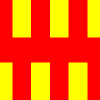Grammar Guide 16 - Complements
Complement - a word, phrase, or clause that is necessary to complete the meaning of a given expression.
Complements help add meaning or a story to the subject and verb of a sentence, for example.


There are five types of Complements:
-
Direct Object - The direct object receives the action of the verb and is usually a noun or pronoun. Tip: Ask yourself "Who" or "What" to identify the direct object in a sentence.
- Billy drank lemonade. (Lemonade is the direct object)
-
Object Complement - An object complement follows and modifies or refers to a direct object. It can be a noun, pronoun, adjective, or phrase.
- Billy painted his kitchen yellow. (Kitchen is the direct object. Yellow is the object complement)
-
Indirect Object - An indirect object comes between the verb and the direct object and answers the question "to whom?" or "for whom?"
- Billy passed Joey the lemonade. (Lemonade is the direct object. Joey is the indirect object)
-
Predicate Adjective - A predicate adjective is an adjective that comes after a linking verb to describe the subject, answering the question "what?" Linking verbs are verbs like: to be, feel, remain, taste, stay, etc
- The juice tasted sweet. (Sweet is the predicate adjective. Tasted is the linking verb)
-
Predicate Nominative - A predicate nominative is a noun or pronoun that also comes after the linking verb, but it renames the subject and answers the question "who?" or "what?"
- That short man is my cousin. (Cousin is the predicate nominative)

-
References:
- Kern, Jara. (2020). The Infographic Guide to Grammar. Adams Media
- Venolia, Jan. (2001). Write Right! (4th ed.). Ten Speed Press
-
 7
7



0 Comments
Recommended Comments
There are no comments to display.
Create an account or sign in to comment
You need to be a member in order to leave a comment
Create an account
Sign up for a new account in our community. It's easy!
Register a new accountSign in
Already have an account? Sign in here.
Sign In Now